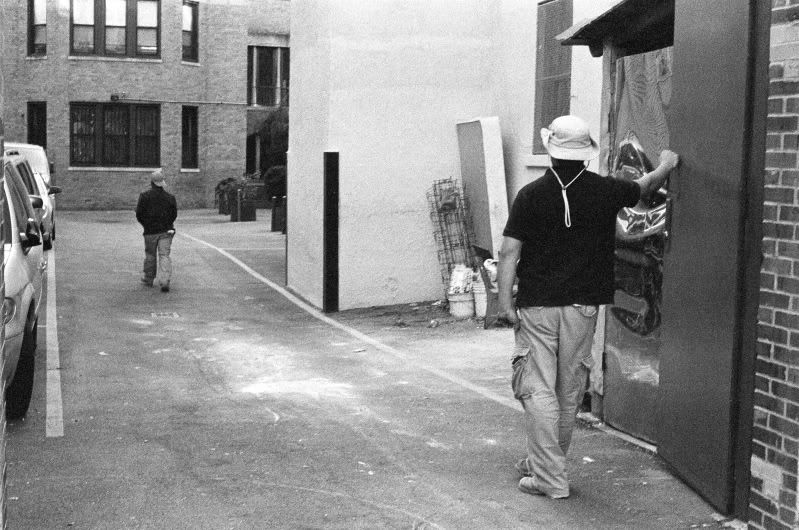Street photography is not a crime
Street photography is not a crime
Third, taking people's pictures feels intrusive. I don't like having my picture taken myself, and taking someone's image feels like stealing on a very deep level (maybe it's just that like most people who pride themselves on being very rational I'm also deeply superstitious.) I seem to need to feel that a photograph on the street is philosophically justifiable in some way --aesthetically, journalistically, or what have you --otherwise it's an inexcusable exploitation of another human being on a very serious level; it's an existential exploitation, almost a form of involuntary enslavement.
Finally, it's hard not to feel the weight of the billions of images that are made every day and wonder why one would want to add to them.
Jack
PS Oh, and then there are the thoughts I'm sure many of you have had about whether or not, in being choosy about cameras and lenses, I'm not just indulging in a sort of equipment fetishism that is not only beside the point but actually a distraction from really thinking about the photograph. . . that sort of thing ;-) .
J.
Jack,
I'd like to address numbers three and four as well as your postscript -
3: Being photographed -
every day that we draw breath - is now a fact of life in today's world. I find it both ironic and incomprehensible that there are apparently legions of people who voice not one word of objection to the surveillance fetishism of various government agencies and entities, yet take umbrage over the documentary photographer making images on the street. It just doesn't add up.
In the U.S., photographers have the right - not privilege, but
right - to make photographs in any public place (and for those who will try to claim the ridiculous - public restrooms, shower rooms, and changing rooms are
not included in that right).
Making photographs in public places is not unlawful, unethical, immoral or improper in any manner. Laws vary from nation to nation but one can still make a valid contention that regardless of written laws, documentary photography in the public environment is still not unethical, immoral or improper by any logical or reasonable definition.
The mere act of making photographs of people is not inherently intrusive - the methods employed in making photographs may be intrusive, though. The photographic techniques employed by Bruce Gilden are considered intrusive by many. Gilden does indeed make some unique images - but his methods aren't for everyone nor are they well liked by many of his subjects.
The techniques that Henri Cartier-Bresson employed in his street photography were not intrusive; the vast majority of his subjects never knew that they were being photographed. Many photographers employ HCB's stealth approach today for the simple reason that street photography done in a manner that is discreet and does not disturb the subject is not offensive, disruptive or abrasive. The photographic stalking and badgering techniques of the paparazzi are obnoxious, intrusive and traumatic to the subject - and sometimes worse.
Until photographers come to terms with the fact that photographing strangers in the public environment is not unlawful, unethical, improper or unseemly, they will needlessly suffer from self-inflicted feelings of guilt or discomfort that are not based on any reasonable or objective philosophy.
4: Yes, there are billions of images created every day;
so what?
99.5% (or more) of the photographs made every day are devoid of any semblance of artistic relevance, perception, visual impact, aesthetic value or technical merit. The vast majority of photographs made each day are of approximately as much value to the world of photography as a head cheese sandwich is to the culinary world.
Anyone who cares about image making pursues photographic and artistic perfection; they work relentlessly to hone their visual, technical and photographic composition skills, develop their photographic style and produce enduring, meaningful images. They strive to produce the photographic equivalent of a Beethoven symphony - not a vapid, shallow rap
"hit."
Regarding your concerns of equipment fetishism - we have to have cameras and lenses to be able to make photographs - period. We don't have to carry six cameras, forty lenses and ten flash units (the "National Geographic Assignment Syndrome") to make photographs.
Too much equipment is usually counterproductive to the photographic process. I have found that the best approach is to tailor the gear you carry for the task at hand.
A couple of camera bodies (one for a backup) a wide angle lens, a normal lens and a short telephoto lens is all a person really needs. This modest amount of gear will cover 90% or more of all the photographic possibilities one might encounter.
Buy the best equipment you can reasonably afford and use it every day that you can - the camera you have with you when a photo presents itself will make a better image than the pie-in-the-sky megadollar camera that you can't (yet) afford.
Live in the now, photograph in the now - and save up for that Hasselblad/Leica/Ebony/whatever. One day it will be yours, especially if you produce outstanding work that sells and is in demand.
JMHO.

